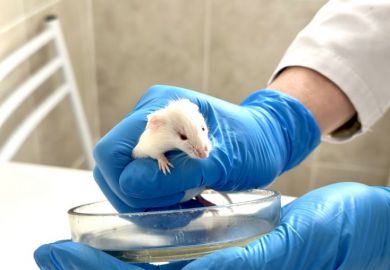The appearance of creationist argument in a research paper in a respected biology journal has provoked concern among academics.
The paper, which appeared in Proteomics last month, argues that a "single common fingerprint initiated by a mighty creator" explains the relationship between proteins produced by mitochondria (cellular components that have their own genome) and cells themselves.
Evolutionary theory suggests that mitochondria started as bacteria and evolved to live inside cells in an "endosymbiotic" relationship.
The paper's authors, Mohamad Warda and Jin Han of Korea's Inje University, cast doubt on this theory, arguing that the existence of proteins common to different forms of life are "more likely to be interpreted as a reflection of a single common fingerprint initiated by a mighty creator than relying on a single cell that is, in a doubtful way, surprisingly originating all other kinds of life".
The 15-page article, "Mitochondria, the missing link between body and soul: Proteomic prospective evidence", concludes: "We still need to know the secret behind this disciplined organised wisdom. We realise so far that mitochondria could be the link between the body and this preserved wisdom of the soul devoted to guaranteeing life."
The article has sparked consternation among academics and science internet bloggers since it was published online last month.
Paul Myers, associate professor of biology at the University of Minnesota, called the paper "a baffling failure of peer review" on his blog, "Pharyngula". "It should have been savaged by any competent reviewer," he said. Although the paper contained a "substantial, knowledgeable core," it was "pimpled with genuinely bizarre eruptions of unsupported lunacy", he said.
The director of the University of Maryland's centre for bioinformatics, Steven Salzberg, used his blog, "Genomics, Evolution and Pseudoscience" to accuse the paper's authors of putting "blatant creationist conclusions, not justified in any way, in a peer-reviewed article". He wrote: "The title of this article should have warned reviewers," he wrote.
Co-author Mr Warda told Times Higher Education that to criticise Western science was "taboo". He said: "It is clear that the fingerprint of (the) mighty creator (is) inside everyone in this Universe."
After initially claiming that evolution was a "useless, evidence-less" theory, he said the process did take place, but under the control of "complete, disciplined wisdom" and not in a chaotic way. "Even one amino acid, when mutated in any of millions of tiny different cell receptors in their body, can kill or ruin life," he added. "Is this chaos?"
Dr Han was not available for comment.
Michael Dunn, editor-in-chief of Proteomics and a professor at University College Dublin's Conway Institute of Biomolecular and Biomedical Research, was quoted in the Chronicle of Higher Education saying "it's not our policy to promote creationism". He told Times Higher Education that a decision on whether to retract the article would be made this week.
Register to continue
Why register?
- Registration is free and only takes a moment
- Once registered, you can read 3 articles a month
- Sign up for our newsletter
Subscribe
Or subscribe for unlimited access to:
- Unlimited access to news, views, insights & reviews
- Digital editions
- Digital access to THE’s university and college rankings analysis
Already registered or a current subscriber?



